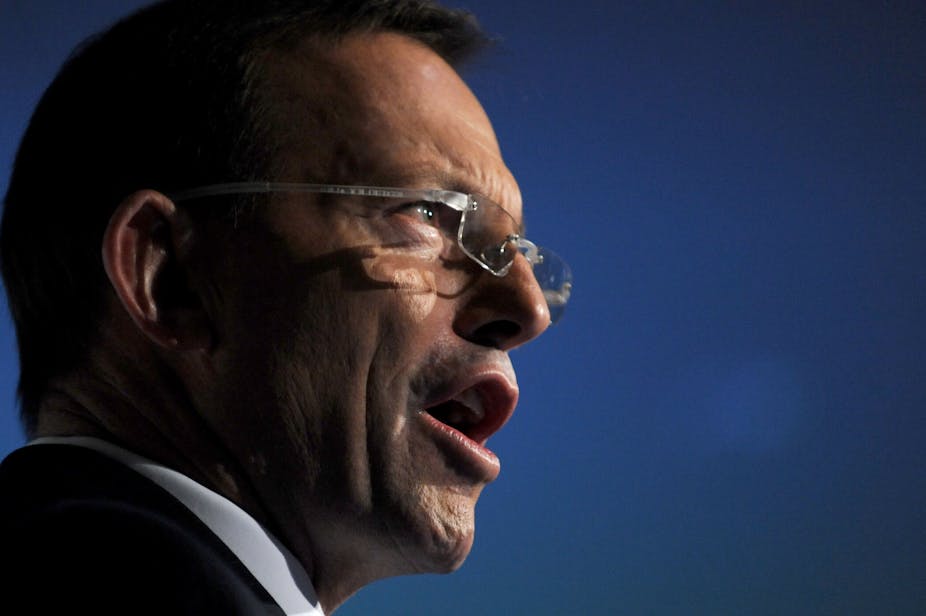Earlier this month, opposition leader Tony Abbott presented the second instalment of the Liberal and National parties’ “Plan for Stronger Communities”, having already outlined elements of the plan at the National Press Club.
The plan bears striking similarity to the UK government’s “Big Society” policies that have been implemented since Prime Minister David Cameron’s election in May 2010 – policies that promote small government with (notionally) greater power given back to local citizen groups.
In his “landmark speech” to the Pratt Foundation, the opposition leader spoke of several “community” oriented themes and policies such as locally managed schools and hospitals, asserting that “a community that invests its own time and money” rather than being “controlled by distant bureaucracies” will have “more social capital and a stronger social fabric than one which doesn’t.”
He reiterated the Opposition’s commitment to returning the budget to surplus, cutting government spending, reducing taxes and investing in infrastructure. As in his January press club speech, the speech contained contradictory pledges to reduce taxes while ensuring better services and increased social spending.
Australian voters may be growing desensitised to this paradox as it has been a feature of most recent state elections. Premiers Baillieu, Newman and O’Farrell all promised to strengthen public services, then justified their post-election retrenchment of thousands of public servants as a necessary measure to balance state budgets.
Like the British Prime Minister, Australia’s opposition leader is committed to redefining the role of the state and, correspondingly, the roles of the private and community sectors. Like Cameron, Tony Abbott has been influenced by the ideas, arguments and policies advocated by Phillip Blond, director of UK think tank ResPublica and his 2010 book “Red Tory”.
Last June, Abbott welcomed Blond as a “friend of Australia” to address a forum convened by the Liberal Party’s think tank, the Menzies Research Institute. During his visit, Blond briefed senior Liberals.
Several characteristic Big Society policies featured in Mr Abbott’s “Stronger Communities” plan: restricting welfare entitlement, mandatory “work for the dole”, mutual obligation and a contestable market for services. In the UK, three quarters of a million government employees will be retrenched over six years as a huge range of formerly government-run services are commissioned to “any willing provider”.
Abbott’s reference to “little platoons” was an especially clear link to the UK’s Big Society policies. Phillip Blond attributed the notion to Edmund Burke, the “father of modern conservatism”, who used this expression to describe formal and informal networks.
The opposition leader’s little platoons include service clubs, charities, school and hospital auxiliaries, volunteer bush fire brigade and Landcare groups that “give people a sense of wider purpose and belonging.”
Australians will respond positively to leaders who affirm and celebrate our culture of volunteerism. About 40% of us volunteer each year and we consistently rank near the top of the World Giving Index, an amalgam of three giving behaviours: helping a stranger, volunteering time and giving money.
Like Cameron and Blond, Abbott asserts that Government “can’t create” these little platoons, but it “can certainly hinder them especially if it habitually assumes that the official knows best.” His Stronger Societies platform appeals to and reinforces a populist small government ideology.
Small government advocates claim that governments “get in the way”, meddle excessively in citizens’ lives, and impede economic progress through unnecessary red (or green) tape. Its proponents assume private sector efficiency while overlooking the widely held community preference for public servants to deliver health, education and other services and the even stronger reservations about the public benefits of privatisation.
They neglect public servants’ role in managing government finance, making, monitoring and enforcing laws and regulations, and policy development. And they overlook the importance of a strong state to respond to complex and unexpected change such as natural disasters, climate change or economic upheaval.
Small government is shaping up to be a volatile ingredient in pre-election debates to come. Last month, Former Reserve Bank governor and Treasury secretary Bernie Fraser observed “there is an "extreme ideology of small government” in Australia that fails to ensure “competence, fairness, and compassion”. And just last week, the small government alignment was claimed with pride by NSW Treasurer Michael Baird when he declared that the state’s budget would retrench 10,000 public servants (additional to the 5,000 announced late 2011).
In the UK, two years of David Cameron’s Big Society policies have energised a national debate about the reciprocal relationship between the public and community sectors. Initial enthusiasm about “community empowerment” has turned to strident criticism as corporations have dominated service delivery contracts and community sector organisations have been forced to shed staff and programs. Volunteerism has been unable to fill the vacuum of a withdrawing state, even with compulsory volunteer programs.
I hope there is a similarly energised debate about the role of the state in Australia.

